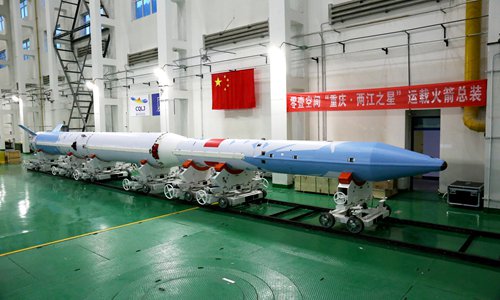


OneSpace's OS-M has completed preparations for its first orbital launch. Photo: Courtesy of OneSpace
China rolled out rules for the first time to regulate commercial rocket manufacturing, test flights and launches, a move to boost the commercial space sector's sound development, industry representatives told the Global Times on Tuesday.
The guideline, the first of its kind since China's private companies were allowed to enter the space sector in 2014, said that only after obtaining permission from the State Administration of Science, Technology and Industry for National Defense, may commercial rocket companies conduct research and production, according to the authority's website on Monday.
Commercial rocket companies should notify related departments before they begin research and production. Complete confidential systems and secrets management systems should also be established, said the guideline.
It also encourages private rocket companies to take full advantage of national resources in terms of rich technology research, production equipment and facilities, and launch sites.
"The specifics give a clear direction for China's commercial space industry, clarifying the qualifications, operational boundaries and national guarantees, which will be conducive to the sector's healthy and orderly development," Shu Chang, CEO of Beijing-based commercial rocket pioneer OneSpace Technology, told the Global Times on Tuesday.
"Meanwhile, we hope regulators can strengthen guidance over us and jointly build a more open, flexible and efficient cooperation mechanism for the sector's sustainable development," said Shu.
Yao Bowen, assistant president of another Beijing-based private rocket firm iSpace, also known as Beijing Interstellar Glory Space Technology, told the Global Times on Tuesday that the policy comes just at the moment when the commercial space sector is facing a lack of official guidance on combining real operations with regulations.
"Rules and qualifications clarify that the industry needs higher thresholds, which will help accelerate this generation of industry leaders," said Yao, adding that the guideline also benefits investors when selecting projects.
Both OneSpace and iSpace are pioneers in the domestic commercial space industry.
Since China encouraged civilian-military integration in 2014, private rocket companies have mushroomed, vying for contracts based on their advantages in terms of low costs and high efficiency.
There are more than 30 companies in the private commercial rocket field in China, according to media reports. There is bound to be an industry reshuffle in the next few years with only one or two companies surviving, according to Shu.
In 2018, more than 70 venture capital companies invested in more than 30 Chinese space start-ups, raising a total of 2.1 billion yuan ($300 million) in 34 rounds, according to a report released in January by Beijing-based think tank FutureAerospace.
 Fire brigade in Shanghai holds group wedding
Fire brigade in Shanghai holds group wedding Tourists enjoy ice sculptures in Datan Town, north China
Tourists enjoy ice sculptures in Datan Town, north China Sunset scenery of Dayan Pagoda in Xi'an
Sunset scenery of Dayan Pagoda in Xi'an Tourists have fun at scenic spot in Nanlong Town, NW China
Tourists have fun at scenic spot in Nanlong Town, NW China Harbin attracts tourists by making best use of ice in winter
Harbin attracts tourists by making best use of ice in winter In pics: FIS Alpine Ski Women's World Cup Slalom
In pics: FIS Alpine Ski Women's World Cup Slalom Black-necked cranes rest at reservoir in Lhunzhub County, Lhasa
Black-necked cranes rest at reservoir in Lhunzhub County, Lhasa China's FAST telescope will be available to foreign scientists in April
China's FAST telescope will be available to foreign scientists in April "She power" plays indispensable role in poverty alleviation
"She power" plays indispensable role in poverty alleviation Top 10 world news events of People's Daily in 2020
Top 10 world news events of People's Daily in 2020 Top 10 China news events of People's Daily in 2020
Top 10 China news events of People's Daily in 2020 Top 10 media buzzwords of 2020
Top 10 media buzzwords of 2020 Year-ender:10 major tourism stories of 2020
Year-ender:10 major tourism stories of 2020 No interference in Venezuelan issues
No interference in Venezuelan issues
 Biz prepares for trade spat
Biz prepares for trade spat
 Broadcasting Continent
Broadcasting Continent Australia wins Chinese CEOs as US loses
Australia wins Chinese CEOs as US loses